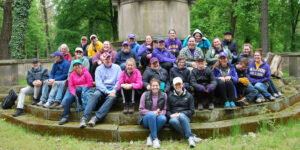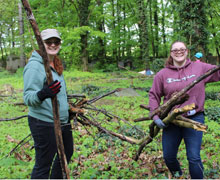Holocaust Studies’ Poland Trip Adds Context to Coursework
June 9, 2017

Albion College’s 2017 Holocaust Studies group at a World War I memorial in the New Jewish Cemetery in Wroclaw, Poland.
By Jake Weber
During a College-sponsored trip to Poland last month, Cameron Voss, ’20, noted an incident that underscores the trip’s importance. “Rachael Vitale uncovered a gravestone that really excited the cemetery curator. He told us a family was coming the next week to look for this grave,” Voss said. “We couldn’t lift that stone, but we were able to prop it up so the family could see it.”
Connecting the past to the future is an important part of Albion’s Holocaust Studies Service-Learning Project, which this year involved 21 students and seven faculty and staff on the 10th biennial trip. The group spent a week cleaning a vandalized and neglected Jewish cemetery in Wroclaw, Poland, along with visiting Auschwitz and Birkenau concentration camps, the Oskar Schindler factory in Krakow, and a modern Jewish synagogue near the Wroclaw cemetery.
At its peak, the Jewish community in Wroclaw numbered in the thousands; today only a handful remain. The project honors the place of a people who have mostly vanished from Wrocław and Poland in the wake of the Holocaust, and helps the remaining community to reclaim an important cultural and historical artifact.
Despite snowfall on the first day, Voss described the work as joyful. “We uncovered hundreds of graves and markers. It’s a satisfying feeling to brush away dirt and see a name. My first person, I said ‘Hi, Clara,'” Voss recalls. “It’s a really exciting feeling to find these people and fight against them being forgotten as another kind of victims of the Holocaust.”

Cameron Voss, ’20 (left), and Rachael Vitale, ’18, clear branches and brush.
Voss, who chose Albion in part because of the Holocaust service project, took three Holocaust-related courses during her first year, which she described as a “year of anticipation.”
“I felt remarkably well prepared,” she said. But “when you read and study, it’s a black-and-white picture. When you’re there, the colors start to come in.”
“The Holocaust Studies Service-Learning Project is a deeply meaningful example of intentional integration of knowledge,” said Provost Marc Roy. The trip, he says, “brought to life the events we had read about and discussed in class. We stood in the Krakow plaza, where 65,000 Jewish people were assembled for deportation. We walked through the barracks in Auschwitz and Birkenau and paused in the spot where an SS officer made decisions about who could work and who would go to the gas chambers. Many of us had tears in our eyes, imagining the atrocities that more than a million people went through.”
Voss discovered the trip was far more than simply “color” for her academic understanding. “I spent a whole year looking at the past and this one portion of time. When I was in the cemetery, I was helping in the present, and when we visited a synagogue, the people spoke of the future, how they’re growing their community,” Voss said.
“Working in the present and learning about the future really helped me.”
Read a full chronicle of the trip on the 2017 Holocaust Studies Service-Learning Project blog.